left-behind children
批改网英语翻译内容
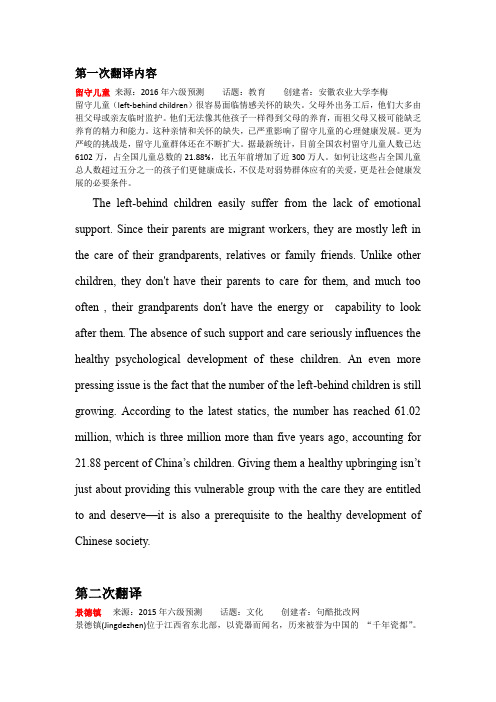
第一次翻译内容留守儿童来源:2016年六级预测话题:教育创建者:安徽农业大学李梅留守儿童(left-behind children)很容易面临情感关怀的缺失。
父母外出务工后,他们大多由祖父母或亲友临时监护。
他们无法像其他孩子一样得到父母的养育,而祖父母又极可能缺乏养育的精力和能力。
这种亲情和关怀的缺失,已严重影响了留守儿童的心理健康发展。
更为严峻的挑战是,留守儿童群体还在不断扩大。
据最新统计,目前全国农村留守儿童人数已达6102万,占全国儿童总数的21.88%,比五年前增加了近300万人。
如何让这些占全国儿童总人数超过五分之一的孩子们更健康成长,不仅是对弱势群体应有的关爱,更是社会健康发展的必要条件。
The left-behind children easily suffer from the lack of emotional support. Since their parents are migrant workers, they are mostly left in the care of their grandparents, relatives or family friends. Unlike other children, they don't have their parents to care for them, and much too often , their grandparents don't have the energy or capability to look after them. The absence of such support and care seriously influences the healthy psychological development of these children. An even more pressing issue is the fact that the number of the left-behind children is still growing. According to the latest statics, the number has reached 61.02 million, which is three million more than five years ago, accounting for 21.88 percent of China’s children. Giving them a healthy upbringing isn’t just about providing this vulnerable group with the care they are entitled to and deserve—it is also a prerequisite to the healthy development of Chinese society.第二次翻译景德镇来源:2015年六级预测话题:文化创建者:句酷批改网景德镇(Jingdezhen)位于江西省东北部,以瓷器而闻名,历来被誉为中国的“千年瓷都”。
英语副词试题(有答案和解析)及解析
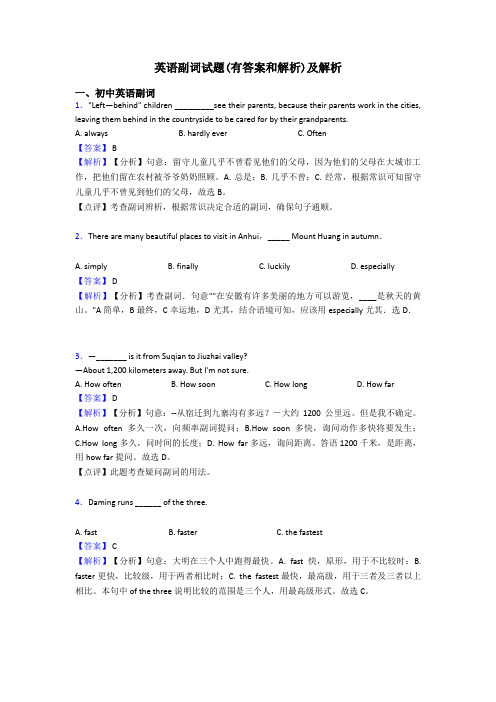
英语副词试题(有答案和解析)及解析一、初中英语副词1."Left—behind" children _________see their parents, because their parents work in the cities, leaving them behind in the countryside to be cared for by their grandparents.A. alwaysB. hardly everC. Often【答案】 B【解析】【分析】句意:留守儿童几乎不曾看见他们的父母,因为他们的父母在大城市工作,把他们留在农村被爷爷奶奶照顾。
A. 总是;B. 几乎不曾;C. 经常,根据常识可知留守儿童几乎不曾见到他们的父母,故选B。
【点评】考查副词辨析,根据常识决定合适的副词,确保句子通顺。
2.There are many beautiful places to visit in Anhui,_____ Mount Huang in autumn.A. simplyB. finallyC. luckilyD. especially【答案】 D【解析】【分析】考查副词.句意""在安徽有许多美丽的地方可以游览,____是秋天的黄山。
"A简单,B最终,C幸运地,D尤其,结合语境可知,应该用especially尤其.选D.3.—_______ is it from Suqian to Jiuzhai valley?—About 1,200 kilometers away. But I'm not sure.A. How oftenB. How soonC. How longD. How far【答案】 D【解析】【分析】句意:--从宿迁到九寨沟有多远?-大约1200公里远。
但是我不确定。
A.How often多久一次,向频率副词提问;B.How soon多快,询问动作多快将要发生;C.How long多久,问时间的长度;D. How far多远,询问距离。
leftbehindchildren的中文

leftbehindchildren的中文
leftbehind children 的中文名称是留守儿童,这是指父母在外地或外
国工作,留下孩子在家乡或者城市寄宿学校内,缺少父母陪伴和关爱
成长的一类特殊儿童。
在中国,留守儿童的数量已经达到了惊人的数目。
根据教育部的统计,留守儿童的数量已经超过了6100万,这些孩子的大部分生活在贫困的
农村地区,他们往往缺少爸爸妈妈的陪伴,造成了很大的身心压力。
那么,留守儿童具体都存在哪些问题呢?下面是具体的几个方面:
1. 心理问题
留守儿童经常处于被忽视和缺乏关爱的状态下,这导致他们在心理上
存在很多问题,比如孤独、无助、自卑等等。
2. 交际问题
留守儿童由于缺少家庭环境的陪伴,很难与同龄人进行交流,这容易
导致他们不适应学校和社会生活,进一步影响了他们的成长。
3. 教育问题
留守儿童在教育层面上也存在着诸多问题,他们很少有机会接触到良
好的教育资源,因此在教育成果方面经常存在问题。
4. 安全问题
父母不在身边的留守儿童往往没有成年人的监护,这使得他们更加容易成为犯罪分子的目标,而且这些孩子也很难保护自己。
5. 营养问题
留守儿童由于没有父母的照顾,容易在饮食方面过于单调或不营养,对身体健康会有很大的负面影响。
为了解决留守儿童的问题,社会各界都在积极开展相关的扶助工作。
比如政府会出台相关的扶助政策,同时各种公益组织也会向这些孩子提供力所能及的援助,而希望更多的人关注留守儿童的问题,助力这些孩子健康成长。
left behind children

Left-behind children subject of new census(人口普查)-----By ‘C hina daily ‘Left-behind children (留守儿童)The ministry of civil affairs will conduct a census of left-behind children in 2016.a senior official said.Ni chunxia deputy(副)director of the minidtry’s department of social affairs,said it will be the first national-level census of left-behind children.Song yinghui ,a law professor at Beijing Normal university, said china has 100 million children from migrant workers’ families ,more than 60 million who were left behind in their hometown ,and more than 36 million travel with their migrant worker parents.‘the number -100 million –is about one third of Chinese children under 18,which means that one in three (1/3)children in china is left-behind or travels with parents,’song said, adding that this presents a challenge to social administration.The number of left-behind children in china has never been agreed upon.‘one number is about 60 million ,and the other is about 80 million’ ,said wan guowei ,associate professor specializing in public administration at Lanzhou university ,adding that difference comes from the absence of both parents or only one parent.The last survey of left-behind children by an authoritative organization was done by the All-china women’s federation in 2013,which estimated that china had about 61.2 million left-behind children.With rapid urbanization over the last two decades, millions of migrant workers have moves to cities , leaving their children at home.A 2015 survey conducted by shangxuelushang, an NGO(non-govern –mental-organization) that help left-behind children , said about 15 percent of them reported having no physical contact with their parents during the course of a calendar year.Four percent received just one phone call a year from parents , it said .The neglect(忽视) caused some tragedies ,in June, four sibling(兄妹) aged 5 to 13 who had been left behind in bijie ,guizhou province, committed suicide by drinking pesticide (杀虫剂) at home.‘left-behind children ‘s tragedies may hit the front pages of newspapers for a few days, but when the stories go cold ,people’s attention shifts. The key to solving the problem is to establish a system to help them and prevent such tragedies .’said Liu wenkui, a secretary –general of the china foundation for poverty Alleviation.The central government is taking action to establish a system to address theplight(困境) of left behind children. A guideline for their protection was signed by premier Li keqiang and released in Feb ru ary.The comprehensive survey of left-behind children will be carried out by the ministry of civil affairs and other government organs. Such as the ministry of education and the ministry of public security. According to vice-minister of civil affairs zou ming at a state council information office media briefing in February.A new section to protect left-behind children in rural areas was set up by the civil affairs in February.‘ the section will effectively link social assistance .welfare and other resources and also work to link government organs to improve a whole system to department of social affairs said.The section will carry out the census.(将展开人口普查)。
关爱留守儿童的英语作文
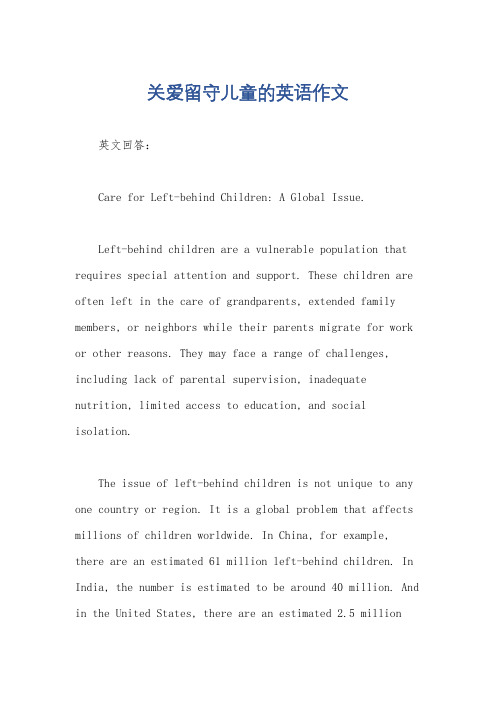
关爱留守儿童的英语作文英文回答:Care for Left-behind Children: A Global Issue.Left-behind children are a vulnerable population that requires special attention and support. These children are often left in the care of grandparents, extended family members, or neighbors while their parents migrate for work or other reasons. They may face a range of challenges, including lack of parental supervision, inadequate nutrition, limited access to education, and social isolation.The issue of left-behind children is not unique to any one country or region. It is a global problem that affects millions of children worldwide. In China, for example, there are an estimated 61 million left-behind children. In India, the number is estimated to be around 40 million. And in the United States, there are an estimated 2.5 millionleft-behind children.The consequences of leaving children behind can be severe. These children are more likely to experience developmental delays, health problems, and behavioral issues. They are also more likely to drop out of school and engage in risky behaviors.Addressing the issue of left-behind children requires a multifaceted approach that involves governments, communities, and families. Governments can providefinancial support to families, improve access to education and healthcare, and create programs that support left-behind children. Communities can offer after-school programs, mentoring, and other forms of support. And families can stay in regular contact with their children, even when they are separated by distance.中文回答:关爱留守儿童,全球性问题。
留守儿童的英语
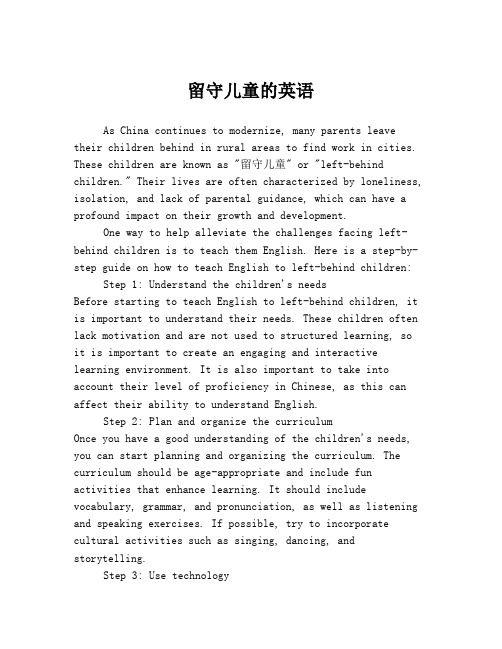
留守儿童的英语As China continues to modernize, many parents leavetheir children behind in rural areas to find work in cities. These children are known as "留守儿童" or "left-behind children." Their lives are often characterized by loneliness, isolation, and lack of parental guidance, which can have a profound impact on their growth and development.One way to help alleviate the challenges facing left-behind children is to teach them English. Here is a step-by-step guide on how to teach English to left-behind children: Step 1: Understand the children's needsBefore starting to teach English to left-behind children, it is important to understand their needs. These children often lack motivation and are not used to structured learning, so it is important to create an engaging and interactive learning environment. It is also important to take into account their level of proficiency in Chinese, as this can affect their ability to understand English.Step 2: Plan and organize the curriculumOnce you have a good understanding of the children's needs, you can start planning and organizing the curriculum. The curriculum should be age-appropriate and include funactivities that enhance learning. It should include vocabulary, grammar, and pronunciation, as well as listening and speaking exercises. If possible, try to incorporate cultural activities such as singing, dancing, and storytelling.Step 3: Use technologyTechnology can be a powerful tool in teaching English toleft-behind children. There are many online resources thatcan be used, such as interactive games, videos, and audio recordings. These resources make learning fun and interactive, while also improving the children's listening and speaking skills.Step 4: Use real-life situationsIt is important to teach English in context, using real-life situations that the children will encounter. For example,teach them how to introduce themselves, order food at a restaurant, or ask for directions. This not only makeslearning more practical, but it also helps to build the children's confidence in using English.Step 5: Involve the communityFinally, involving the community in teaching English to left-behind children can be very effective. Community members can act as mentors, providing the children with a positive role model and someone to talk to. They can also help withlanguage exchange programs, where the children can practice their English with native speakers.In conclusion, teaching English to left-behind childrenis a valuable way to help these children overcome their challenges and improve their future prospects. By creating an engaging and interactive learning environment, using technology and real-life situations, and involving the community, we can empower these children to succeed.。
留守儿童-四级翻译

• 原文: • 中国快递服务(courier service)一年递送大约120亿件包裹, 这使中国有可能赶超美国成为世界上最大的快递市场。 大多数包裹里装着网上订购的物品。中国给数百万在线 零售商以极具竞争力的价格销售商品的机会,仅在11月 11日,中国消费者就在国内最大的购物平台买了价值90 亿美元的商品。中国有不少这样的特殊购物日,因此, 快递能在中国扩展就不足为奇了。
• Chinese parents tend to place so much emphasis on their children’s learning that they won’t let their kids do any housework。 The primary demands that they want to make of their children are to study hard, to achieve high grades in order to enter top universities。 They believe it is good for their children because in such a highly competitive society, only the best achievement can ensure a bright prospect。 Also, Chinese parents claim that they will be respected if their children get significant status in the society。 Therefore, they are willing to sacrifice time, habits and interest of their own to provide their children with better living conditions.
对留守儿童的看法
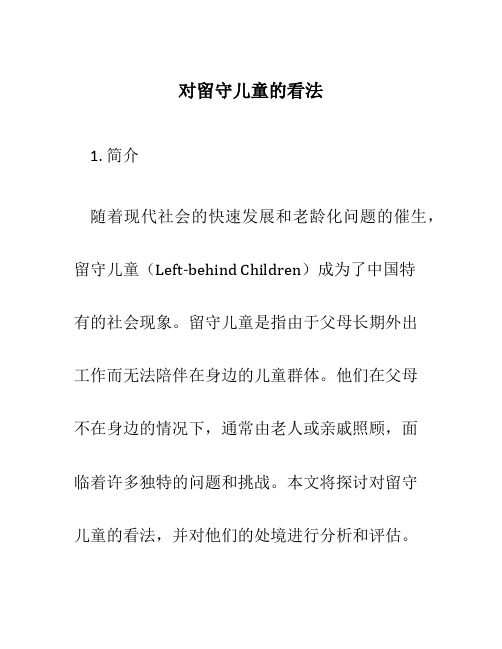
对留守儿童的看法1. 简介随着现代社会的快速发展和老龄化问题的催生,留守儿童(Left-behind Children)成为了中国特有的社会现象。
留守儿童是指由于父母长期外出工作而无法陪伴在身边的儿童群体。
他们在父母不在身边的情况下,通常由老人或亲戚照顾,面临着许多独特的问题和挑战。
本文将探讨对留守儿童的看法,并对他们的处境进行分析和评估。
留守儿童问题的根源可以追溯到中国的城市化进程和经济发展。
父母为了谋生,需要到城市找工作,但由于经济和资源的分配不均,他们往往不能将自己的子女带到城市居住。
因此,留守儿童问题的主要原因包括经济压力、教育资源不均等。
3.1 教育问题由于父母不在身边,留守儿童通常无法得到良好的教育资源。
他们可能无法享受到良好的学校教育,缺乏学习和发展的机会。
这种局面可能会导致他们在学业上的落后,影响他们的未来发展。
3.2 心理问题留守儿童长期缺乏父母的陪伴,容易感到孤独和无助。
他们可能面临着自尊心受损、焦虑和抑郁等心理问题。
缺乏家庭的温暖和关爱,他们可能更容易受到外界不良影响,陷入不良行为中。
3.3 社会适应问题由于长期与父母分离,留守儿童可能缺乏良好的家教和社会交往的机会。
他们可能缺乏适应社会的能力和成人礼仪,对人际关系和社交场合感到困惑和不安。
3.4 健康问题留守儿童的健康问题也备受关注。
长时间缺乏父母的关爱,他们可能饮食不规律,生活习惯不健康,容易导致肥胖、近视等健康问题。
4. 解决留守儿童问题的措施4.1 政策层面政府应该制定相关政策,加大对留守儿童问题的关注和治理力度。
例如,通过增加对农村教育的投入、完善社会保障体系等方式,改善留守儿童的生活和教育环境。
学校应该关注留守儿童的特殊需求,提供针对性的教育和心理支持。
通过组织丰富多样的课外活动,增强留守儿童的社交能力和人际交往能力。
4.3 社会层面社会应该关注留守儿童问题,加强对他们的关爱和支持。
志愿者组织可以通过定期探访、心理咨询等方式,给予留守儿童更多的关爱和帮助。
大学英语四级模拟试卷854(题后含答案及解析)

大学英语四级模拟试卷854(题后含答案及解析)题型有:1. Writing 2. Reading Comprehension (Skimming and Scanning) 3. Listening Comprehension 4. Reading Comprehension (Reading in Depth) 5. Cloze 7. V ocabulary and Grammar 8. TranslationPart I Writing (30 minutes)1.Left-Behind Children1.近年来,随着进城打工的农民工越来越多,农村的留守儿童也随之增加2.对留守儿童的管理和教育存在着很多问题3.为了解决这个问题,我认为……正确答案:Left-Behind Children The population of left-behind children has greatly increased these years because more and more migrant workers are swarming into cities. It leads to many problems on the administration and education of the left-behind children. To start with, they are not old enough to take good care of themselves while the grandparents they usually live with are too old to attend to them. Next, without proper discipline from the adults, they are likely to skip classes and make troubles. Finally, the mental health of the children tends to be in question. Growing concern has been given to the life and education of the left-behind children. To solve the problem, the participation of parents is of great importance. Teachers can also be helpful by giving them more love and care. Still, great efforts should be made by the whole society.解析:①开篇点题,指出留守儿童不断增加这一现象。
【素养阅读】:Left-behind_Children

【素养阅读】:Left-behind Children1.1 时文推荐Left-behind ChildrenChina is now a strong and powerful country, people can do better job, earn more money. More and more young people in villages go to cities for works, so many young mothers and fathers have to leave their kids at home. People call this kind of children“ left-behind children”.There are about 58 million left-behind children in rural China and over 40 million of them are under 14 years old. A report finds more than half of the children who are left behind don't live with either parent. The telephone is often the only way they can contact with their mothers or fathers. Most of them are poor, some of them have difficulties going to school.They are in the care of their grandparents or other relatives. So the problem of left-behind children has become a big problem of our country.There is a song to the left-behind children’s mothers and fathers. Here is the song “dad and mum, since you leave home, I have learnt selfcare, I have learnt cooking, I have learnt feeding pigs and chickens. Dad and mum do not worry about me because I can do my homework by myself, I can wash my cloth and I can comb my hair. I know you do not want to leave me alone and have to do it. I know how much you love me. Please take good care of you and work without any anxiety about me. I promise I will study hard and listen to my grandfather’s words. I will grow up soon….” These words touch many people’s heart . It sounds really sad. At the same time, more people know about this group of children. People realize there are many children in the villages need their love, care and help. They, the left-behind children, let people know that not all the people can live a happy life in present society, especially the people in poor rural areas.Left-behind children are a group of children who need help, care, concern and love. They do not live a rich life and are not in a comfortable environment. They lack too much than those children who have a normal life. So they need to be paid attention by others. Now left-behind children have attracted lots of attention. Hope and believe their life can be better and soon.1.2 推荐理由在中国飞速发展的今天,农村的劳动力涌入城市,于是在中国农村出现了一个特殊的群体---留守儿童。
留守儿童英语作文
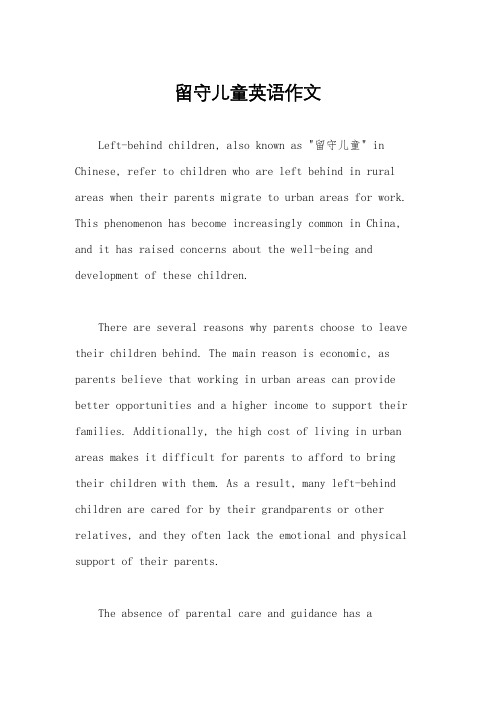
留守儿童英语作文Left-behind children, also known as "留守儿童" in Chinese, refer to children who are left behind in rural areas when their parents migrate to urban areas for work. This phenomenon has become increasingly common in China, and it has raised concerns about the well-being and development of these children.There are several reasons why parents choose to leave their children behind. The main reason is economic, as parents believe that working in urban areas can provide better opportunities and a higher income to support their families. Additionally, the high cost of living in urban areas makes it difficult for parents to afford to bring their children with them. As a result, many left-behind children are cared for by their grandparents or other relatives, and they often lack the emotional and physical support of their parents.The absence of parental care and guidance has asignificant impact on the well-being of left-behind children. They often experience feelings of loneliness, abandonment, and insecurity, which can lead to emotionaland behavioral problems. They may also struggle academically, as they lack the supervision and support needed to succeed in school. Furthermore, the lack of parental involvement can hinder their emotional and social development, leading to difficulties in forming healthy relationships and coping with stress.To address the challenges faced by left-behind children, it is crucial to provide support and resources to both the children and their families. This includes improving access to education, healthcare, and social services in rural areas, as well as creating opportunities for parents to spend time with their children. Additionally, effortsshould be made to raise awareness about the impact of migration on children and to promote policies that support the well-being of left-behind children.In conclusion, the issue of left-behind children is a complex and pressing concern that requires attention andaction. By addressing the economic, social, and emotional needs of these children, we can help ensure that they have the opportunity to thrive and reach their full potential. It is important for society as a whole to recognize the challenges faced by left-behind children and to work towards creating a more supportive and nurturing environment for them.。
关爱留守儿童志愿者英语作文
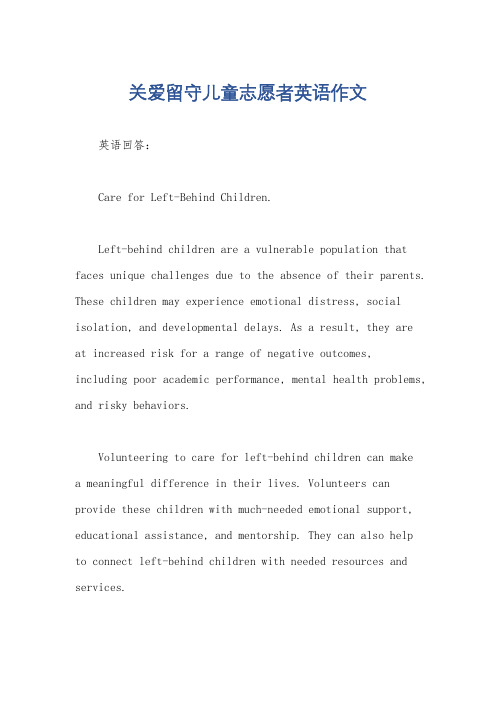
关爱留守儿童志愿者英语作文英语回答:Care for Left-Behind Children.Left-behind children are a vulnerable population that faces unique challenges due to the absence of their parents. These children may experience emotional distress, social isolation, and developmental delays. As a result, they areat increased risk for a range of negative outcomes,including poor academic performance, mental health problems, and risky behaviors.Volunteering to care for left-behind children can makea meaningful difference in their lives. Volunteers can provide these children with much-needed emotional support, educational assistance, and mentorship. They can also helpto connect left-behind children with needed resources and services.There are many opportunities to volunteer with left-behind children. Some organizations provide after-school programs or tutoring services. Others offer mentoring or counseling programs. Volunteers can also get involved by participating in community events or fundraising activities.Volunteering to care for left-behind children is a rewarding experience that can make a real difference intheir lives. By providing these children with support and guidance, volunteers can help them to overcome the challenges they face and reach their full potential.中文回答:关爱留守儿童。
关爱留守儿童的英语作文
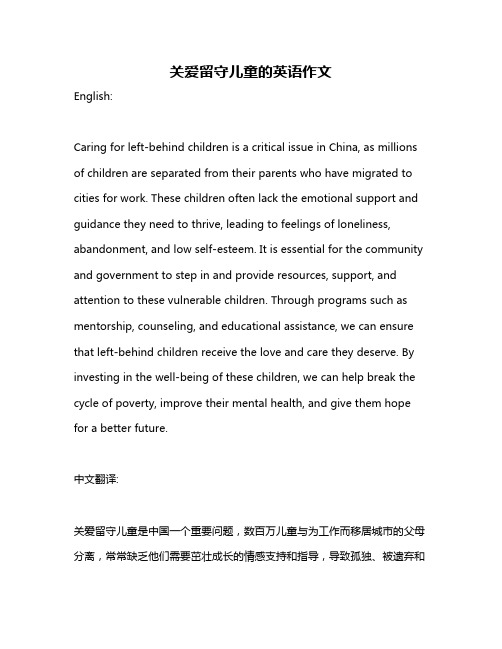
关爱留守儿童的英语作文English:Caring for left-behind children is a critical issue in China, as millions of children are separated from their parents who have migrated to cities for work. These children often lack the emotional support and guidance they need to thrive, leading to feelings of loneliness, abandonment, and low self-esteem. It is essential for the community and government to step in and provide resources, support, and attention to these vulnerable children. Through programs such as mentorship, counseling, and educational assistance, we can ensure that left-behind children receive the love and care they deserve. By investing in the well-being of these children, we can help break the cycle of poverty, improve their mental health, and give them hope for a better future.中文翻译:关爱留守儿童是中国一个重要问题,数百万儿童与为工作而移居城市的父母分离,常常缺乏他们需要茁壮成长的情感支持和指导,导致孤独、被遗弃和自尊心低的感觉。
留守儿童 英文作文
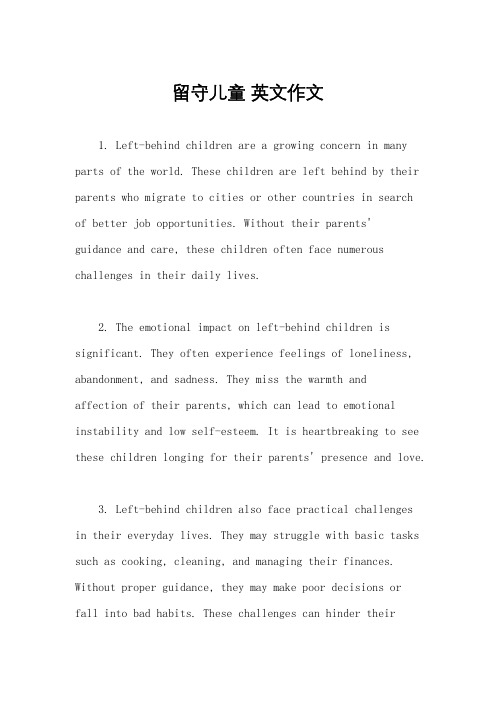
留守儿童英文作文1. Left-behind children are a growing concern in many parts of the world. These children are left behind by their parents who migrate to cities or other countries in searchof better job opportunities. Without their parents'guidance and care, these children often face numerous challenges in their daily lives.2. The emotional impact on left-behind children is significant. They often experience feelings of loneliness, abandonment, and sadness. They miss the warmth andaffection of their parents, which can lead to emotional instability and low self-esteem. It is heartbreaking to see these children longing for their parents' presence and love.3. Left-behind children also face practical challengesin their everyday lives. They may struggle with basic tasks such as cooking, cleaning, and managing their finances. Without proper guidance, they may make poor decisions orfall into bad habits. These challenges can hinder theirpersonal development and future prospects.4. Education is another area where left-behind children often face difficulties. They may have limited access to quality education due to their remote locations or lack of financial resources. This can result in a lack of opportunities for their future and perpetuate the cycle of poverty.5. The impact of being a left-behind child extends beyond their childhood. As they grow up, they may have difficulty forming trusting relationships and may struggle with emotional intimacy. The absence of parental guidance during their formative years can have long-lasting effects on their overall well-being and happiness.6. It is crucial for society to address the issue of left-behind children and provide support to these vulnerable individuals. Efforts should be made to improve access to education and healthcare services in rural areas. Additionally, community programs and initiatives can help provide emotional support and mentorship to these children.7. Ultimately, it is important to remember that every child deserves a loving and supportive environment to grow and thrive. By acknowledging and addressing the challenges faced by left-behind children, we can work towards creating a more inclusive and compassionate society for all children, regardless of their family circumstances.。
关爱留守儿童英语作文初二

关爱留守儿童英语作文初二Caring for Left-behind Children。
In China, there are many children who are left behind by their parents in order to work in the cities. These children are called left-behind children. They live with their grandparents or other relatives, and they often lack the care and attention of their parents.As a society, we need to do more to support and care for left-behind children. One way to do this is to provide them with better education and opportunities. Many left-behind children live in rural areas where the schools are underfunded and understaffed. By investing in better education, we can help these children to build a better future for themselves.Another way to care for left-behind children is to provide them with more social and emotional support. Many of these children feel isolated and lonely, and they maystruggle with mental health issues like depression and anxiety. By providing them with more opportunities to socialize and connect with others, we can help them to feel more supported and less alone.Finally, we need to raise awareness about the issue of left-behind children and encourage more parents to stay with their children. Many parents feel that they have no choice but to leave their children in order to find work, but if we can create more job opportunities in rural areas, we can help to keep families together.In conclusion, caring for left-behind children is an important issue that requires the support of the whole society. By investing in better education, providing more social and emotional support, and raising awareness about the issue, we can help to improve the lives of these children and create a better future for all.。
留守儿童感到孤独英语作文

留守儿童感到孤独英语作文The Loneliness Felt by Left-behind Children。
Introduction:In recent years, the issue of left-behind children has gained significant attention in China. These children are left behind in rural areas while their parents migrate to cities for work. As a result, they often experience feelings of loneliness and isolation. This essay will explore the causes of their loneliness and propose potential solutions.Body:1. Causes of loneliness:a) Physical separation from parents: Left-behind children are physically separated from their parents for extended periods, leading to a lack of emotional supportand guidance.b) Lack of companionship: These children often have no siblings or friends to interact with, making them feel lonely and isolated.c) Communication difficulties: Due to limited access to technology and communication tools, left-behind children struggle to maintain regular contact with their parents, exacerbating their feelings of loneliness.2. Psychological and emotional impact:a) Low self-esteem: The absence of parental support and guidance may lead to a lack of self-confidence and a negative self-image.b) Mental health issues: Loneliness can contribute to the development of anxiety, depression, and other mental health problems in left-behind children.c) Academic performance: The emotional distresscaused by loneliness can negatively impact a child'sability to concentrate and perform well in school.3. Potential solutions:a) Community support: Local communities and schools can organize activities and programs to provide emotional support and companionship for left-behind children.b) Parental involvement: Parents can make efforts to maintain regular communication with their children through phone calls, letters, or video chats to reduce feelings of loneliness.c) Government initiatives: The government can implement policies and programs to improve the living conditions and education opportunities for left-behind children, ensuring their overall well-being.Conclusion:The loneliness experienced by left-behind children is apressing issue that requires attention and action. By addressing the root causes of their loneliness and implementing effective solutions, we can create a nurturing environment for these children, helping them overcome their feelings of isolation and promoting their overall well-being.。
我们应该帮助留守儿童的英语作文初二
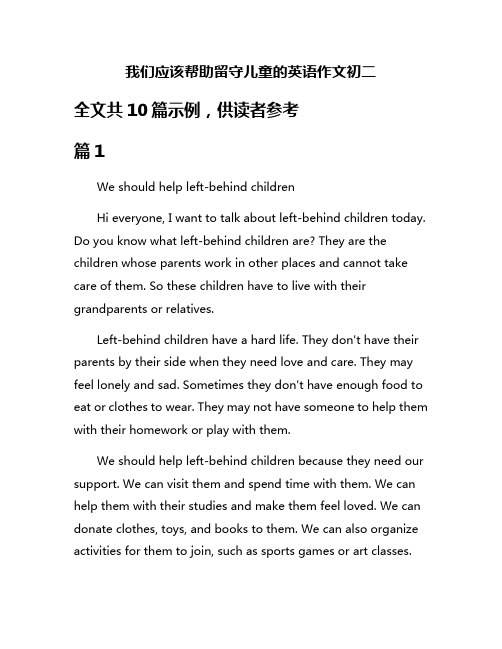
我们应该帮助留守儿童的英语作文初二全文共10篇示例,供读者参考篇1We should help left-behind childrenHi everyone, I want to talk about left-behind children today. Do you know what left-behind children are? They are the children whose parents work in other places and cannot take care of them. So these children have to live with their grandparents or relatives.Left-behind children have a hard life. They don't have their parents by their side when they need love and care. They may feel lonely and sad. Sometimes they don't have enough food to eat or clothes to wear. They may not have someone to help them with their homework or play with them.We should help left-behind children because they need our support. We can visit them and spend time with them. We can help them with their studies and make them feel loved. We can donate clothes, toys, and books to them. We can also organize activities for them to join, such as sports games or art classes.By helping left-behind children, we can make a difference in their lives. We can show them that they are not alone and that there are people who care about them. Let's reach out to them and make their world a better place!篇2Hey guys! Today I wanna talk to you about helpingleft-behind children. You know, those kids whose parents have to work far away and can't be with them. It's really important for us to help them and make sure they're okay.First of all, we can be good friends with them. Sometimes, left-behind children might feel lonely and sad because they miss their parents. We can play with them, talk to them, and make them feel loved and cared for. It's important to show them that they're not alone and that we're there for them.Secondly, we can help them with their homework. Some left-behind children might not have someone to help them with their schoolwork, so they might struggle with their studies. We can offer to study with them, explain things to them, and encourage them to do their best. This way, we can help them succeed in school and build their confidence.Lastly, we can support them in any way we can. Whether it's giving them a listening ear, helping them with chores, or just being there for them when they need someone to talk to, we can make a difference in their lives. It's important to show kindness and compassion to left-behind children and make sure they know that they're valued and appreciated.In conclusion, we should all do our part to help left-behind children. By being good friends, helping with their homework, and offering support, we can make a positive impact on their lives. Let's show love and kindness to those in need and make the world a better place for everyone. Thanks for listening, guys! Let's go out there and make a difference!篇3Title: Let's Help Left-Behind ChildrenYo, guys! Today, I wanna talk about left-behind children. They are kids whose parents work in other places and cannot take care of them, so they have to stay in their hometowns with their grandparents or relatives. It may sound cool to have freedom and no parents around, but actually, it's not fun at all. Left-behind children often feel lonely, sad, and neglected.So, why should we help left-behind children? Well, first of all, they need love and care just like all of us. Imagine being all alone without your mom or dad for days or even months. It must be really tough, right? We can make a big difference in their lives by showing them kindness and support.Secondly, we can help left-behind children by spending time with them. We can play games, do homework together, or simply chat with them. They will feel so happy and grateful to have someone to talk to and hang out with. We can also invite them to join our activities and make them feel included in our community.Moreover, we can donate books, toys, clothes, and other necessities to left-behind children. Many of them live in poor conditions and cannot afford basic things. By giving them what they need, we can bring smiles to their faces and make their lives a little bit easier.In conclusion, let's be kind and compassionate towardsleft-behind children. We can make a positive impact on their lives by showing them love, spending time with them, and helping them in any way we can. Together, we can make a difference and bring happiness to those who need it the most. Let's lend a hand and support our left-behind friends!篇4Title: Let's Help Left-behind ChildrenHey guys! Today I want to talk about left-behind children. You know, these are the kids whose parents have to work far away from home and they don't get to see them often. It's really sad because they miss their moms and dads a lot.I think we should all try to help left-behind children. We can start by being their friends and spending time with them. We can play games together, help them with their homework, or just listen to them when they want to talk.Another way we can help is by donating things they need, like clothes, books, or toys. I know not everyone has a lot of money, but even small things can make a big difference to these kids.We can also encourage our parents, teachers, and other adults to support left-behind children. Maybe they can organize activities or programs to help these kids feel loved and cared for.Remember, we are all in this together. Let's be kind and compassionate towards left-behind children, and show themthat they are not alone. Let's make a difference in their lives, one small act of kindness at a time. Thanks for listening!篇5Title: Let's Help Left-behind ChildrenHey guys, have you heard about left-behind children? They are kids whose parents work far away in the city, leaving them in the care of their grandparents or other relatives in the village. It can be tough for them because they don't have their parents around to take care of them and guide them.As students, we can do our part to help these left-behind children. One way we can help is by being a good friend to them. We can play with them, help them with their schoolwork, and just be someone they can talk to when they feel lonely. We can also invite them to join us in activities like sports, art, or music so they can have some fun and feel included.Another way we can help is by donating books, toys, clothes, or other things they might need. We can organize a donation drive at school and collect items to give to the left-behind children in our community. By sharing what we have, we can make their lives a little bit better.We can also raise awareness about the issue of left-behind children and encourage others to help out too. We can talk to our teachers, parents, and community leaders about how we can support these children and make sure they have the care and resources they need.Remember, even though we are still young, we have the power to make a difference in the lives of left-behind children. Let's show them kindness, love, and support, and let them know that they are not alone. Together, we can make the world a better place for all children. Let's do our part to help left-behind children!篇6Title: Let's Help Left-behind Children!Hey everyone! Do you know what left-behind children are? They are kids whose parents have to work in other cities, so they have to stay in their hometown with their grandparents or other relatives. Sometimes they feel lonely and sad because they don't have their parents around to take care of them.We should all try to help left-behind children because they need our love and support. We can show them kindness by spending time with them, playing games, or doing fun activitiestogether. We can also help them with their schoolwork and encourage them to keep learning and growing.We can donate toys, books, clothes, and other things toleft-behind children to make them feel happy and loved. We can also raise awareness about their situation and ask our friends and family to help them too.Let's all come together and make a difference in the lives of left-behind children. Remember, a little kindness goes a long way. Let's show them that they are not alone and that we care about them. Together, we can make the world a better place for all children!篇7We should help left-behind childrenHey guys! Today I want to talk about something really important - helping left-behind children. Do you know whatleft-behind children are? They are kids whose parents have to go to work in other cities and can’t take them along, so they have to stay in their hometown with their grandparents or other relatives. It can be really tough for these kids because theydo n’t have their mom and dad around to take care of them.So, what can we do to help these left-behind children? Well, there are a few things we can do. First of all, we can be their friends and spend time with them. We can play games together, help them with their homework, or just listen to them when they w ant to talk. It’s important for them to know that they are not alone and that there are people who care about them.Secondly, we can donate clothes, books, toys, or other things that they might need. Sometimes, their families don’t have a lot of money, so any help we can give them will be much appreciated. We can also volunteer at local organizations that support left-behind children, like orphanages or schools.Lastly, we can raise awareness about the issue of left-behind children and try to get more people involved in helping them. We can talk to our friends, teachers, and parents about the importance of supporting these kids and encourage them to do what they can to make a difference.In conclusion, we should all do our part to help left-behind children. They deserve to have a happy and healthy childhood, just like any other kid. Let’s show them that we care and that they are not alone. Thank you for listening!篇8Title: Let's Help Left-behind ChildrenHey everyone, today I want to talk about left-behind children. Do you know who they are? Left-behind children are kids whose parents work in other cities and can't come home very often. It must be really tough for them, don't you think?I think we should all try to help left-behind children. There are many ways we can do this. We can be their friends and play with them whenever we can. We can also help them with their homework and make sure they are not feeling too lonely.Another way we can help is by donating things they need, like clothes, books, or toys. We can also organize events or activities for them to participate in, so they have something fun to do.Most importantly, let's show them love and care. Let's make sure they know that they are not alone and that we are there for them no matter what. Just a little bit of kindness can go a long way in making a left-behind child's life better.So, let's all come together and do our part to helpleft-behind children. They deserve our love and support, and we can make a difference in their lives. Let's be their angels andmake their days a little brighter. Together, we can make the world a better place for everyone. Thank you!篇9As a primary school student, I think we should helpleft-behind children. Left-behind children are kids whose parents work far away from home and can't take care of them every day. They often feel lonely and sad.There are many ways we can help left-behind children. One way is to be their friend and play with them. We can invite them to join our games and activities. This will make them feel included and happier.We can also help left-behind children with their schoolwork. We can study together and explain things they don't understand. This will make them feel supported and more confident in their studies.Another way to help left-behind children is to show them kindness and care. We can give them hugs, listen to their feelings, and offer them encouragement. This will make them feel loved and valued.In conclusion, it is important to help left-behind children because they need our support and friendship. By being kind, caring, and helpful, we can make a positive difference in their lives. Let's all do our part to help left-behind children feel happy and loved!篇10We Should Help Left-behind ChildrenHey guys, do you know what left-behind children are? They are kids whose parents work in other cities, so they have to stay in their hometown with their grandparents or relatives. It can be really tough for them because they don’t get to see their parents often and they might feel lonely and sad.As good friends and classmates, we should try to help these left-behind children. There are many ways we can make a difference in their lives. For example, we can include them in our games and activities during recess, so they don’t feel left out. We can also invite them to join our study groups or do homework together, so they feel supported and encouraged.Another way we can help is by talking to them and listening to their feelings. Sometimes all they need is someone to listen and understand their struggles. We can also organize fun eventsand outings for them, so they have something to look forward to and enjoy.But most importantly, we should be kind, compassionate, and supportive towards left-behind children. We should treat them with respect and show them that they are not alone. By being good friends and classmates, we can make a big difference in their lives and make them feel loved and valued.So let’s all come together and show kindness and support to left-behind children. Let’s be their friends and make a positive impact in their lives. Together, we can make a difference!。
写给留守儿童最建议英语作文初二

写给留守儿童最建议英语作文初二Title: Advice for Left-behind ChildrenIntroduction:In recent years, the issue of left-behind children in rural areas has become a growing concern in China. These children are usually left behind by their parents who go to work in the cities, leaving them to be taken care of by elderly relatives or left to fend for themselves. As a result, these children often face numerous challenges and hardships in their daily lives. In this article, we will discuss some advice for left-behind children to help them cope with their circumstances and thrive despite their challenging circumstances.Advice for Left-behind Children:1. Stay Connected with your Parents:Even though your parents may be physically absent, it is important to stay connected with them emotionally. Make sure to communicate with them regularly through phone calls, video chats, or letters. Let them know how you are doing and share your thoughts and feelings with them. This will help you feel closer to your parents and maintain a strong bond with them despite the distance.2. Set Goals and Focus on your Education:One way to overcome the challenges of being a left-behind child is to set goals for yourself and focus on your education. Education can be a powerful tool to help you succeed in life and overcome the disadvantages of your circumstances. Make sure to study hard, attend school regularly, and participate in extracurricular activities to develop your skills and knowledge.3. Seek Support from Teachers and Community:Don't be afraid to seek support from teachers, mentors, and other members of the community. They can provide you with guidance, encouragement, and assistance to help you navigate through the difficulties you may face. Join clubs or organizations at school, participate in community events, and build relationships with people who can support and uplift you during tough times.4. Take Care of your Physical and Mental Health:It is important to take care of your physical and mental health as a left-behind child. Make sure to eat nutritious meals, exercise regularly, get enough sleep, and practice self-care activities to stay healthy and strong. Take care of your mental health by expressing your emotions, seeking counseling ifneeded, and practicing mindfulness techniques to reduce stress and anxiety.5. Stay Positive and Stay Strong:Being a left-behind child can be challenging, but it is important to stay positive and stay strong in the face of adversity. Focus on the things you can control, set small goals for yourself, and celebrate your achievements along the way. Remember that you are not alone and that there are people who care about you and want to see you succeed.Conclusion:In conclusion, being a left-behind child is not easy, but with the right mindset and support, you can overcome the challenges and thrive in life. Remember to stay connected with your parents, focus on your education, seek support from others, take care of your health, and stay positive and strong. By following this advice, you can overcome the obstacles in your path and create a bright and successful future for yourself.。
留守儿童 英语

留守儿童英语Left-behind children are a particular group of children who are left in rural areas of China under the care of relatives due to the migration of their parents or guardians working in cities. Left-behind children are usually from extremely poor familiesand most of them live in extremely hard conditions, especiallyin terms of psychological care.Left-behind children need not just physical but also psychological care. Lack of attention and even love from parents have contributed to the psychological problems they might face. Thus, the support and care from the society and the government can help them to deal with the problems. 。
Also, education is the best way to get them out of poverty. The government should provide more funds for the education ofleft-behind children, establish more relevant organizations to help them and encourage them to study hard.In conclusion, the government and the society should give more attention and care to these left-behind children, support and protect them and provide them with a better living environment. With the help of relevant organizations and the government, left-behind children can have a better future.。
- 1、下载文档前请自行甄别文档内容的完整性,平台不提供额外的编辑、内容补充、找答案等附加服务。
- 2、"仅部分预览"的文档,不可在线预览部分如存在完整性等问题,可反馈申请退款(可完整预览的文档不适用该条件!)。
- 3、如文档侵犯您的权益,请联系客服反馈,我们会尽快为您处理(人工客服工作时间:9:00-18:30)。
The 'Left-behind' Generation in ChinaSource:Chinese Women's Research Network | Release Date:2012-12-27- Title:The 'Left-behind' Generation in ChinaAuthor:Source:ReleaseDecember 27, 2012Date:Keyword:left-behind children, foreign passportsWearing a small bib patched with different-colored pieces of cloth, his cheeks roughened by long exposure to the cold winter weather, 17-month-old Huang Jie from Guanqi Village, Guantou Township, Fujian Province, appears no different from any of the other local children.Children at Guantou Overseas Chinese Kindergarten. They allhold foreign passports. [China Daily]Despite his young age, he spares no effort to move a chair taller than himself from one room to another, repeating the deed several times a day.Fearing he may hurt himself, his grandmother, 48-year-old Liu Huizhen, sometimes bends at the waist and with outstretched arms follows the littleboy's steps. The scene is repeated many times every day."Olsen! Stop and take a rest!" shout the passing villagers, who can see the boy through the open doorway. Whenever he hears the word "Olsen", the boystops and raises his head in the direction of the sound before resuming his "work"."Olsen" is what the local people like to call the boy, and after hearing it so many times he has already managed to make the connection between the name and himself. However, when people call him Huang Jie, he makes no response.Giving their children English names is fashionable among young couples in China's larger cities, but Olsen's grandparents are farmers, and their knowledge of social fashion is limited. However, their daughter has told them to call the boy Olsen, because it's the name on his passport.Olsen Huang was born in New York in July, 2011. His parents are both busy working they don't have time to look after him, so his grandparents took him in when he was sent to the village aged just 100 days.There are many small foreigners living there, according to the village head Li Xiaoming - and he should know, his 1-year-old nephew, Li Youwen, is one of them.Olsen sits with his aunt in front of the computer. At 11 am everyday, he has a video chat with his parents in the United States.[China Daily]"He's my brother's son. My brother went to the United States five years ago. The boy was born in New York, but my brother works at a restaurant in a southern state," said Li Xiaoming. "The boy was sent to Guantou when he was eight months old. For the past four months, he has cried heavily at night and we know he's looking for his mom."Large-scale emigrationCurrently, more than 2,000 overseas-born children, known in China as"left-behind" kids, live with grandparents or relatives in Guantou."Almost every family here has some one working overseas. Although their footsteps cover more than 30 countries, most have gone to the US, Canada and Japan," said Lin Xiuzhu, president of Guantou Overseas Chinese Kindergarten, the largest in the town, where more than 90 percent of the students are foreign nationals."When I opened the kindergarten in 2005, there were only 80 foreign-born kids, but the number has increased sharply year by year. We have nine classes now and the number of kids has soared to 380. To guarantee quality of tuition, we no longer recruit children younger than 3," she said.Huang Jie is one of the children left behind in Fujian Provinceby parents who work abroad. [China Daily]Other regions in Fujian, such as Mawei district in Fuzhou, Fuqing city, Changle city and Luoyuancounty are also playing host to kids born to Chinese parents overseas.Around 20,000 children with US nationality live in Fuzhou, said Zheng Qi, president of the Fukien Benevolent Association of America, quoted in the Fuzhou Evening News. If you include those holding other nationalities, the number could be as high as 60,000, he said.Guangdong Province and a number of other costal regions are experiencing the same thing. Enping in Guangdong has acquired the nickname "Little United Nations" because of the number of children born overseas.Large-scale emigration means that the population of Guantou is mainly composed of elders and children. Most young people in the town hail from Sichuan Province."Because most Chinese living overseas do manual work, in restaurants and suchlike, or run their own small businesses, the heavy workload makes the task of taking care of small children impossible, irrespective of whether they have been granted foreign nationality," said Lin Xiuzhu.In addition, many countries have strict child-care regulations. If parents are perceived to be failing their kids and are reported, they run the risk of having their children taken into care. Some parents could even be imprisoned.Many young couples see no alternative but to send their kids back to their parents when they are only a few months old. The kids are often taken abroad again aged 4 or 5 to attend elementary school."Although we have plenty of students, we see kids leave and go abroad every month. Kids generally leave China aged 5, because their US passports are only valid for five years. However, when they arrive here they are at a good age to learn a new language; the earlier they come here, the easier it is for them to integrate," according to Lin Xiuzhu.Onscreen parentsLin Dandan, Olsen's mother, saw him off at the airport last year. However, the boy was too young to remember that his mom was the one crying like a baby.Since then, at 11 am every day, Liu Huizhen, Olsen's grandmother, ensures he is sitting in front of the computer, ready for a video chat with his mother when she gets home after her day's work."We have a video chat almost every day. Seeing Olsen's cute face and the little changes as he grows is the best time in my day," said Lin Dandan. Although Olsen's grandmother has told him repeatedly that the two people in the computer are his mom and dad, the length of their separation means the little boy has little interest in the people waving to him on the screen and trying to attract his attention.Children at Guantou Overseas Chinese Kindergarten. They allhold foreign passports. [China Daily]However, practice makes perfect, and with lots of practice the penny seems to have finally dropped. Even though Olsen still doesn't fully understand, he always points at the computer when people ask him where his parents are.Most of those who went overseas years ago now have a foreign nationality, but more recent arrivals still have a long wait ahead of them.Huang Hui, Olsen's father, went to the US in 2002 and now works as a chef in New York. He was granted US nationality last year, but Lin Dandan, who joined her husband in 2008 and works as a waitress, is still waiting. She works more than 10 hours a day and earns $2,500 a month.She's pregnant again, so to save money the couple lead a thrifty life, but they still provide for Olsen. In addition to sending him baby formula and diapers, they often mail clothing and toys."We can't be with him, so we just want to give him gifts to compensate for that," Lin Dandan said."My daughter hasn't been home for five years. She often cries when we are having a video chat and says it's because she misses us and Olsen. But I know she has a hard life overseas," said her mother.'Greater care, attention'Olsen's case is far from unique, according to Lin Rufeng, a teacher at Guantou Overseas Chinese kindergarten. Even kindergarten kids aged 4 or 5 will say "computer" when people ask about their parents."They have a wealthy life compared with the local kids. Some of their clothes and toys are better than those of kids living in cities, but they are short of their parents' love," she said.The children often display a special interest in younger, rather than older, people, and have a marked attachment to teachers, compared with kids that live with their parents. They are very easily satisfied; a simple hug makes them so happy, according to the teacher."So, in addition to teaching, irrespective of whether we are single or married, we try to behave like mothers and show these kids greater care and more attention," she said.Along with the extra care, classes are also designed to take the kids' situation into account.Children at Guantou Overseas Chinese Kindergarten. They allhold foreign passports. [China Daily]"We don't have English classes, because many parents living abroad say it's better for the kids to learn English overseas from the very beginning. Instead, we have started classes intended to foster an ability for independent living and helping each other," said the kindergarten president Lin Xiuzhu."Chinese language and culture is the other major subject we put special effort into. Although the kids hold foreign nationalities, learning about Chinese culture will help them trace their roots when they grow up," she said."Every time kids leave, we feel sad for several days. But to help them develop, I agree with sending them back to their parents as early as possible. That's because the grandparents usually just look after the kids' health, rather than fostering good habits," she added.Her opinion was shared by XinZiqiang, vice-president of the School of Social Development at the Central University of Finance and Economics."Grandparents are less connected with current social trends and can't form the same sort of attachments as those between children and their parents. People who lacked parental support during childhood are vulnerable. They are likely to be less confident and more introverted when they reach adulthood. Kids without parental care have fewer chances to participate in activities with their peers and that can result in poor social-communication abilities," he said.XiongBingqi, deputy director of the 21st Century Education Research Institute in Beijing, also attached great importance to parental interaction. "Preschool education is really about parents educating their kids. Without the parents' involvement, this early education means nothing. Although these kids are never short of money, they are still 'left-behind', just like the kids of migrant workers. Children who don't see their parents for an extended period are naturally short of family love, and no matter how hard they try, the grandparents simply can't compensate for this," he said."The best way to solve the problem is to send the children back to their parents as soon as possible, but if that can't be done, the parents must arrange as many phone calls and video chats as possible so the kids know their parents' love and affection are more valuable than expensive clothes and toys," he said.。
